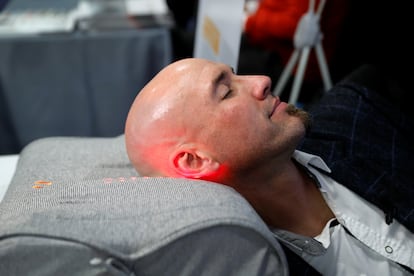Is it possible to stop snoring?
Being overweight is one of the main causes of snoring, but age and sleeping position also have an impact

To find out whether you can stop snoring, you must first understand why you snore. It is also important to consider whether or not snoring is a disease. Snoring is the noise that occurs when breathing while asleep. The airway includes all parts of the respiratory system except for the lungs. When we fall asleep, our airway–which includes the entire respiratory system, except for the lungs–relaxes. It must maintain enough tone to let us keep breathing. When the resistance in that airway increases, because it relaxes too much or because it is under excessive pressure, vibrations occur, causing the sound of snoring.
When excess noise occurs along with a normal passage of air, it is called simple snoring. This is not a disease. Noisy but normal breathing can be an aesthetic problem, bothering the people sleeping nearby, but it is not pathological.
But snoring can also be the first phase of a wide spectrum that reaches its most serious consequence with obstructive sleep apnea. The airway, which is a flexible tube, can produce noise by vibrating. But noise can also occur if the airway contracts and even closes completely. Sleep apnea is a disease with significant consequences and that must be treated.
Snoring is very common. 40% of men over the age of 40 snore, although only 10% of men of that age have obstructive sleep apnea.
There are several reasons why snoring occurs. One of the main factors is being overweight. When the airway, which is a muscle, is pressured by a greater weight of fat around it, it tends to become obstructed. Men tend to accumulate more fat in their necks, making snoring more frequent in men.
The second most important factor is age. As we get older, the airway loses tone and becomes more easily obstructed. Over the years, we begin to snore more. It is also affected by dryness or inflammation: if we have tonsillitis or pharyngitis, we snore more.
Sleeping position also matters a lot. If we sleep on our back, we snore more. If we lie on our side, as the airway is more protected and open, we snore less. External elements can also affect it: for example, alcohol weakens the airway and makes us snore more. Some drugs also relax the airway. Facial structure can also have an impact, such as having a nasal septum that obstructs the nose or a very small chin that reduces the length of the airway.
Once we know why snoring occurs, we can determine how to resolve it. But we must be aware that simple snoring is only treated because it is annoying, not because it is a disease.
For overweight snorers, the most effective measure is to lose weight. Patients report that they stop snoring or snore less when they lose weight. The presence of a humidifier in the room may also have a minor impact on snoring, though it will not eliminate it.
If a snorer has a blockage in their nose or excessively large nasal polyps, surgery may improve their condition. But an operation may not eliminate snoring altogether. Avoiding alcohol is also an effective measure against snoring, as well as changing sleeping position. Treatments exist to help readjust sleeping posture, including devices that detect when the person is face up and emit a vibration so that person turns onto their side. These devices are also used in the treatment of obstructive sleep apnea.
For sleep apnea patients, treatments can end snoring altogether. Interventions include mandibular advancement devices, which can be used by people who experience simple snoring. They move the jaw forward, leaving a little more space for the airway. The next step is CPAP, a device used only for apnea sufferers, not for simple snoring. The CPAP machine with a mask that is placed on the patient’s nose and mouth, putting pressure on the airway to keep it open throughout the night. The pathway stays open, and the patient naturally stops snoring. Under no conditions, however, would a sleep specialist prescribe a CPAP for simple snoring.
Olga Mediano is a specialist in pulmonology, researching sleep at the Hospital Universitario de Guadalajara.









































